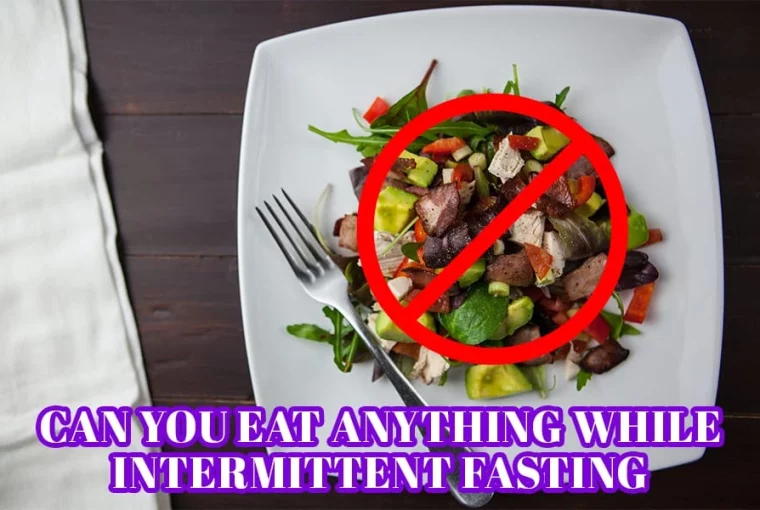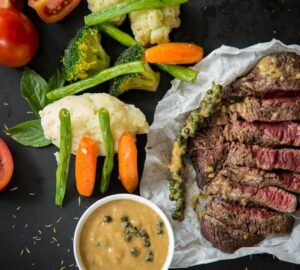Intermittent fasting is simply an eating pattern where one cycles between eating and fasting periods. It’s an important part of a healthy lifestyle.
According to research, intermittent fasting (IF) has many benefits such as weight loss, better digestion, mood, etc. It also increases human growth hormone and reduces insulin levels.
Check out https://synapsext.com for more information on good heart health. People practice intermittent fasting in various ways; the most common methods are the 16:8 and 5:2
During IF, people are usually unsure what type of foods to eat during the feeding window – this leads us to the question.
Can You Eat Anything While Intermittent Fasting?
Truly intermittent fasting offers freedom for people to eat what they want. Technically there are no diet restrictions with IF. Here the eating style is more about food timing than diet composition.
Remember, you need to optimize your intermittent fasting foods for better and faster weight loss. People make the mistake of eating anything they want, including processed junk foods.
Eating too many calories from processed food and empty calories will surely undo all fasting benefits. For better results, you should eat nutrient-dense foods and drink a lot of water.
Eat the food slowly and mindfully – don’t try to make up for what you lost when fasting. If you want to eat healthier, start by cleaning your diet before committing to intermittent fasting.
Replace processed foods with whole foods, take foods that are more plant-based and reduce consumption of sweeteners and refined sugars. After adopting these healthy habits, you can try intermittent fasting.
Ideal Foods For Intermittent Fasting
As mentioned, there aren’t any restrictions or specifications regarding the type and amount of food to take in IF.
All in all, a balanced diet is quite crucial if you want to maintain your energy levels, lose weight, and many more.
Those looking to lose weight need to focus on nutrient-dense foods such as whole grain, beans, veggies, fruits, lean proteins, etc.
Here is a list of some foods you should ensure healthy living. Therefore you should eat plenty of the mentioned foods.
Avocado
The avocado is the fruit with the highest calorie, and most people think it’s not good when you’re trying to lose weight. An avocado has a lot of unsaturated fat content, which will keep you full during the fasting period.
Therefore your body will signal enough food and is nowhere near starvation mode. Adding an avocado to your lunch keeps you full for longer hours.
Water
Technically, water isn’t food, but it’s ideal for getting through intermittent fasting. Water is important to all your major body organs.
You need to always take it in your fasting time since the organs are the most important parts of the human body.
People take different water amounts depending on weight, height, sex, climate, and activity level. Urine is usually the best measure of water in one’s body. It should be pale yellow all time, but pale yellow urine means dehydrated.
Lack of water in our bodies can also cause fatigue, lightheadedness, and headaches. Plain water usually doesn’t excite most people, but adding a few mint leaves or lemon juice will offer it some taste and thus easier to drink.
Cruciferous veggies
Popular foods such as cauliflower, broccoli, Brussels sprouts, etc., are rich in fiber. Eating the foods at the right and regular intervals will help your digestive system – it’ll run smoothly.
According to research, fiber also gives the feeling of fullness, which will help you during the fasting period. In addition, cruciferous veggies reduce cancer risk.
Seafood and Fish
The dietary guidelines call for adults to take about eight to ten fish ounces per week. Fish is rich in proteins and healthy fats, plus it has great vitamin D amounts.
You can include it in all your limited eating windows without getting bored with it. Plus, there are many ways to cook fish – you won’t be out of ideas.
Legumes and Beans
Chili might be a great addition to your intermittent lifestyle. Many foods, especially carbs, offer much energy extra activity energy.
However, do not consume too many carbs. Eat some low calories carbs such as legumes and beans. They will keep you perked in fasting hours.
According to research, certain foods like peas, lentils, chickpeas, and many more can help reduce your body weight without any calorie restrictions.
Potatoes
Potatoes aren’t bad and are among the most filling foods. Including potatoes in your diet will help reduce weight loss. Plus, there’s a close link between potatoes and blood sugar.
Eggs
One large egg contains about 6.24 grams of proteins, and it’s easy to prepare. Eating much protein is the only secret to keeping full and helping you build muscles.
According to studies, people that eat eggs for breakfast usually have less hunger and eat less food throughout the day. If you are looking for great food to take during intermittent fasting, you can try some eggs.
Berries
Berries are the staples of most smoothies and pack several vital nutrients. According to research, people who consume many flavonoids in strawberries and blueberries have a small BMI increase in 14 years than people who don’t.
Nuts
Nuts have higher calories than other snacks but contain good fats, unlike other snack foods. Calories aren’t good, and many are usually worried about it.
It would help if you didn’t have worries when it comes to nuts – according to studies, 1-ounce of serving almonds (20 nuts) contains 20% lesser calories than what’s listed on the label.
Plus, chewing doesn’t completely break down almond cell walls; therefore, a portion of the nut remains intact.
Thus the body won’t absorb them during digestion. It means that almonds won’t expose you to too many calories.
Whole Grains
Being on intermittent fasting and eating whole grains sounds odd to many. However, you should note that whole grains are healthy and offer a lot of proteins and fiber. Therefore eating a little will help you keep full.
The Pros Of Intermittent Fasting
Intermittent fasting has many health benefits, and it perfectly fits into most people’s model of sustainable and healthy long-term diet.
If you are unsure whether intermittent fasting is great for your body, here are some of its benefits that will surely pique your interest.
It’s a sustainable lifestyle change.
To some people, intermittent fasting is intimidating and complicated. However, it’s quite simple. Fasting will surely simplify your day because you will have fewer meal plans.
The amazing thing about intermittent fasting is that you don’t have to do calorie counting, eat specific foods, count your macros, etc.
It means you can still eat the foods you enjoy. An example of intermittent fasting is an early dinner and a late breakfast.
The method can be hard for individuals who are usually hungry during the mornings and love breakfast or those who can’t keep cool till late evening due to different obligations like work schedules.
But some people eat intermittent fasting way instinctively already. Such individuals can easily cope with the IF eating patterns.
Supports weight loss and improve the metabolic health
People usually commit to intermittent fasting to help manage their metabolic health and weight. Metabolic health is how perfectly the human body metabolizes or processes energy.
Metabolic health is popularly measured using blood fat levels, blood sugar, and blood pressure. Intermittent fasting creates a calorie deficit, and therefore your body will have fewer calories than what it requires to maintain current weight.
It’s the reason why most diets have calorie restrictions. There are several intermittent fasting parts, and they are linked with better health, such as:
- Lowering blood pressure – you can find more information on heart health at https://synapsext.com
- Repairs damaged cells
- Protects brain health
- Improves blood pressure
Perfectly works with a nutritious, whole foods diet
Intermittent fasting focuses on when you are eating and not what you are eating. Therefore it’s easy to implement it without changing your current diet.
Their won’t be the pressure to buy special foods typical of what you take daily.
Cons Of Intermittent Fasting
Intermittent fasting is among the best ways to regulate calorie intake and ensure better metabolic health. The different eating patterns are a part of healthy eating but are usually quite hard for an individual to adjust.
It means intermittent fasting is not ideal for everyone. Let’s check out some of the IF downsides you can experience if it’s your first time.
You’ll likely feel hungry.
If you aren’t used to the routine, the 8-12 fasting hours will be quite long. Going hungry to bed several times will surely feel natural unsustainable and unpleasant in the long run.
You’ll have to learn how to overcome natural hunger, and fullness cues get used in intermittent fasting earlier. The great thing is fasting is a schedule that one can adapt.
The other cons of intermittent fasting include a change in mood, and it might go against your intuition.
Conclusion
Intermittent fasting is a popular weight-loss tool, but it’s not for everyone. It’s not ideal for eating disorders and can be unsuitable for children and individuals with underlying health conditions.
If you decide to commit to intermittent fasting, you should note that it’s not diet-specific and that diet quality is crucial.




